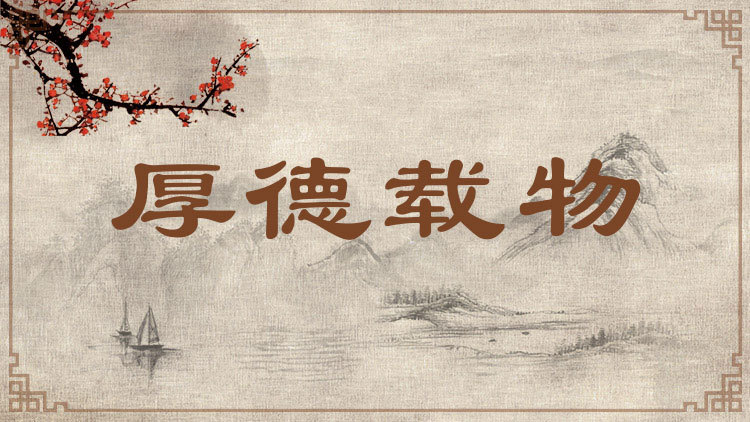厚德载物
Have Ample Virtue and Carry All Things

以宽厚的德性承载天下万物。多指以宽厚之德包容万物或他人。古人认为,大地的形势和特质是宽厚和顺的,它承载万物,使万物各遂其生。君子取法于“地”,要像大地一样,以博大宽厚的道德容纳万物和他人,包含了对自身道德修养及人与自然、社会和谐一体的追求。这是中国人参照大地山川状貌和特质树立的治国理政和为人处世的理念和理想。它和“自强不息”一起构成了中华民族精神的基本品格。
This term means that one should be broad-minded and care for all things and people. Ancient Chinese believed that with its topography and other natural features being generous and peaceful, the earth sustained all things in the world, allowing them to grow and develop in keeping with their own nature. Men of virtue model themselves on the earth, and just like the earth, care for all things and fellow human beings with open heart and virtue. This embodies the pursuit of moral cultivation and harmony among people and between people and nature. It represents the Chinese views and ideals on governance and human relationship, which were inspired by the formation and features of mountains and rivers in China. Together with the notion of constantly exerting oneself for self-improvement, it forms the fundamental character of the Chinese nation.
引例 Citations:
◎地势坤,君子以厚德载物。(《周易·彖上》)
大地的气势厚实和顺,君子应以宽厚美德容载天下万物。
Just like the earth, which is generous and peaceful, a man of virtue should have ample virtue and accommodate all things. (The Book of Changes)
◎地势之顺,以地德之厚也。厚,故万物皆载焉。君子以之法地德之厚,而民物皆在所载矣。(陈梦雷《周易浅述》卷一)
大地的形势是和顺的,因为大地具有宽厚的品德。因其宽厚,所以能承载万物。君子效法大地的宽厚品德,百姓、万物就都能被包容了。
The peaceful nature of the earth is due to its virtue of generosity. Thus, it can accommodate and provide for all things. By modeling himself on the earth, a man of virtue should care for all people and all things. (Chen Menglei: A Simple Account of The Book of Changes)
推荐:教育部 国家语委
供稿:北京外国语大学 外语教学与研究出版社
责任编辑:钱耐安





